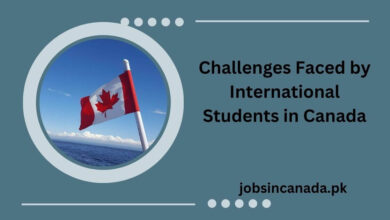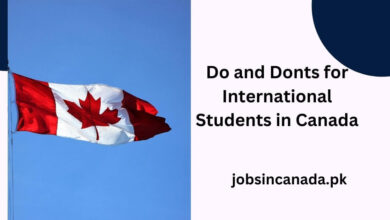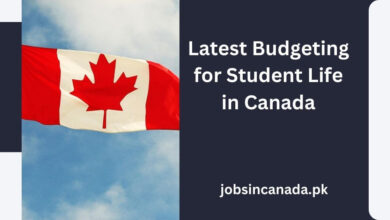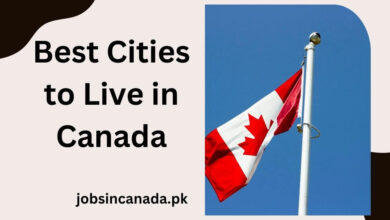Latest Checklist for International Students Before Arrival
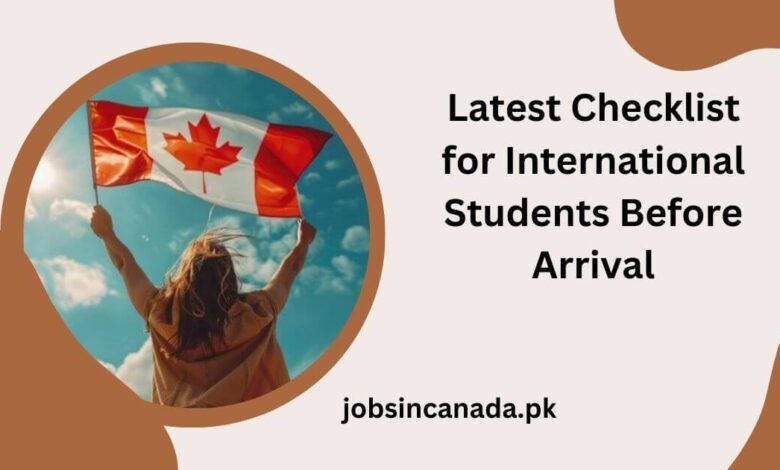
The relocation of international students to Canada can be both thrilling and overwhelming. This may be your initial international relocation on your own. Freedom is accompanied by a significant amount of responsibility. Before commencing your studies in Canada, it is necessary to register for a study permit, locate student housing, and secure funding.
In this article, we offer a pre-arrival checklist for international students who are relocating to Canada. The checklist includes all of the essential tasks that must be completed in your home country before studying in Canada, as well as suggested timelines.
One year before studying in Canada
1. Make your Budget for your studies in Canada
International pupils are required to pay tuition that is significantly higher than that of Canadian permanent residents and citizens. In Canada, you will be required to pay for housing, food, travel, phone costs, entertainment, and other expenses in addition to tuition and other academic fees.
2. Select a Canadian study program
It is advisable to pursue your existing knowledge. Visa officers will authorize your Canadian study program provided that it corresponds with your prior academic or professional pursuits. Additionally, ensure that your Statement of Purpose (also known as a Letter of Intent) details how changing programs will enhance your career when you apply for a study permit.
Before enrolling, verify the admission requirements of Canadian universities and colleges. Your program may necessitate a minimum GPA in previous academic programs, subject study, work experience, academic references, and a high language test score.
Additionally, determine whether your program is eligible for a Canadian Post-Graduation Work Permit (PGWP).
3. Take an approved language test
Canadian courses are predominantly taught in English and French. Language proficiency assessments are mandatory for admission to the majority of educational institutions.
IELTS Academic or TOEFL (iBT) with a cut-off score is typically required by universities. If your score is inadequate, you may retake the examination. The language proficiency of colleges and universities can be evaluated through interviews and statements of purpose.
4. Apply to Canadian universities and colleges.
Compile a list of Canadian universities and colleges that offer specific study programs. Ensure that your educational institutions are designated as international DLIs. Contrast the costs of tuition, admissions, faculty, and student facilities. Furthermore, the majority of colleges impose a non-refundable application fee. Therefore, it is advisable to submit applications to institutions that are more likely to approve you.
The majority of universities admit students during the summer intake, which occurs in September, January, or May. Fall enrollment is typically elevated by the majority of educational institutions. Confirm enrollment in the program.
Submit an application one year prior to the commencement of the first semester. Admissions are closed six to eight months prior to the program’s commencement. Application delays are prevented through pre-deadline inspections.
5. Explore options for funding your education in Canada.
Universities in Canada welcome more than just savings. Scholarships are awarded to international pupils by universities, governments, and other organizations. Needy pupils are assisted by scholarships, grants, and bursaries. International scholarships are accessible based on merit.
6. Check the validity of your passport
Make sure you have plenty of time left on your passport before applying for a study permit, as it cannot be extended. Before applying for a study permit, renew your passport if it expires soon. This however ensures that your study permit lasts the entire program plus 90 days.
Six months before studying in Canada
1. Get your Letter of Acceptance (LOA)
Letters of Acceptance (LOAs) are transmitted to accepted pupils by Designated Learning Institutions (DLIs). Proof of admission to a Canadian university or college is necessary for the submission of your student visa application.
Within a few days, your institution will grant you the opportunity to confirm your enrollment. At this juncture, you will also be required to pay the first-year tuition if you select on-campus accommodation or a meal plan. To prevent delays, it is recommended that you arrange your finances before receiving your letter of authorization.
2. Explore Canadian housing options
After admission, you should choose a place to live. After receiving your LOA, register for on-campus housing at your university or college. Demand for school housing often exceeds supply.
International students often live off-campus near their schools. Ask current students at your new school about off-campus housing. Temporary housing may be best for off-campus students. Then, after exploring the neighborhood and visiting some properties, you can look for longer-term rentals.
3. Check your Student Direct Stream eligibility.
The Student Direct Stream (SDS) has the potential to expedite the processing of study permits for 14 countries, including Brazil, China, the Philippines, and India. Additionally, your study permit application may be processed within 20 business days through the Student Direct Stream.
In order to demonstrate financial support, students who are applying for a study permit under the Student Direct Stream are required to purchase a $10,000 Guaranteed Investment Certificate (GIC). Additionally, documentation of on-campus accommodation and first-year tuition is required.
4. Get study permit documents.
a) Guaranteed Investment Certificate (GIC)
$10,000 GICs are required for SDS study permits. Financial support for a general stream study permit may be demonstrated through a GIC.
CDIC guarantees GICs. You will receive a portion of your GIC each month during your first year of study until you receive the full amount (plus interest).
To apply for an RBC International Student GIC, submit an online application after receiving your Canadian DLI Letter of Acceptance. Banks send GIC certificates, Investment Directions Confirmations, and Investment Balance Confirmations following the purchase. This is mandated by the SDS.
b) Proof of financial support
The evaluation of study permit applications by visa personnel is contingent upon the applicant’s ability to demonstrate their financial capacity to pay for education and living expenses in Canada. Students who are submitting applications for a general stream study permit may also provide documentation of their financial resources, such as:
- Your Canadian bank account is the recipient of the funds you transmitted to Canada.
- Student loans issued by financial institutions.
- Bank statements for the previous four months.
- bank draft denominated in Canadian dollars.
- Tuition and housing receipts.
- A scholarship letter from an institution or individual.
- Evidence of educational programs or scholarships that have been funded by Canada.
c) Letter of Intent (or Statement of Purpose)
A statement of purpose or letter of intent is not necessary for study permit applications. A well-crafted letter of intent (LOI) can persuade the visa officer that you are a genuine student, that your career will be enhanced by studying in Canada, and that you will not exceed the duration of your study permit. This increases the number of applications for study permits. The issuance of study permits is justified by LOIs.
d) Québec Acceptance Certificate (CAQ)
A provincial certificate d’acceptation du Québec (CAQ) is required prior to the submission of an application for a study permit in Quebec. For information on the cost of the CAQ application and the application process, please contact your institution.
5. Canadian study permit Application
Submit all required documentation for an IRCC study permit online. Before submitting an application for a study permit, it is necessary to complete the form, attach documents, and pay the processing fees.
Immigration or educational consultants are the sources from which international students can obtain study permits. Consult the consultants at the CICC. The Canadian government will not communicate with unauthorized consultants, which is a risk. Attempt to avoid individuals who are offering admission to a Canadian university or requesting a study permit through a false claim.
RISIAs assist with study permits, RCICs assist with visas, employment, and study applications, and PR applications.
RISIAs are Canadian organizations that are affiliated with universities. They are able to provide guidance, but they are unable to submit your study permit application.
Three months before studying in Canada
1. Get a Driver’s license extract
A driver’s license extract is issued by your regional transportation authority to confirm that you possess a valid license in your native country and have a history of driving. A driver’s license extract can expedite the Canadian driver’s license procedure for individuals who have two or more years of foreign driving experience.
In Ontario, individuals who have completed the G1 knowledge exam and have accumulated over two years of foreign driving experience are eligible to take the G road test immediately, bypassing the G2 road test and the waiting period. A complete license could be obtained within weeks or months.
Begin the driver’s license extraction process at least a few months prior to your departure, as it may require weeks or months in certain countries.
2. Collect other official documents
Using the Canadian student visa document checklist, compile your academic or professional references, identity documents, academic transcripts, prior employment letters, and other critical documents.
In addition to your study permit application, you may require additional critical documents while in Canada. Bring your marriage certificate, birth certificates, school records, and health records with you if your family is visiting you in Canada.
3. Canadian student bank accounts
Money management is simplified with a Canadian bank account. Before arriving in Canada, it is possible to transmit your savings and have them readily accessible by opening a bank account. Begin the process of opening a student bank account with an RBC Advisor six to eight weeks prior to your arrival.
Open a chequing account in Canada for daily expenses. GIC funds will be transferred to your checking account. Upon your arrival in Canada, you are eligible to register for a credit card.
One month before studying in Canada
1. Choose what you want to bring.
Decide on the items you will bring and commence the preparation process, despite the fact that it is too early to prepare. Verify the government’s import restrictions.
Transport substantial goods, such as furniture. Please be advised that the majority of on-campus housing in Canada is either entirely or partially furnished. Therefore, it is advisable to consult with your university or college. You may require a laptop or phone for academic purposes.
2. Manage your finances
During vacations, you may be able to visit family, even though your academic program may require you to be away from home for a year or more. To prevent tension, consolidate your finances before your departure.
To pursue your education in Canada, you will require an adequate amount of savings. It will also be essential to have convenient access to your savings or home funds. To prevent being charged for services that you will not utilize, it is recommended that you close bank accounts, pay off credit cards, and terminate recurring payments or subscriptions.
Gather bank statements, GIC, education loan, and scholarship documents one month before you arrive in Canada.
3. Find part-time job opportunities
Many international students in Canada are eligible to work part-time. Your study permit specifies whether you are permitted to work.
If you are eligible, begin researching part-time employment before you arrive in Canada. To identify part-time employment opportunities in your vicinity, consult Canadian job portals and consult with current students. Seek opportunities that are consistent with your academic program or that will assist in the development of transferable skills.
You have the option to work part-time after enrolling in education. Once you have obtained information regarding your academic schedule, make employment decisions.
4. Comprehensive health checkup
Consult with your physician, dentist, or ophthalmologist before departing. Obtain a copy of your medical and dental records, update your vaccinations, and obtain prescriptions for any ongoing medications.
It is recommended that you undergo exams and last-minute dental cleanings and fillings prior to departing, as regular vision and dental care is not covered by Canadian provincial and student health insurance plans.
Two weeks before studying in Canada
1. Buy health insurance, if needed.
Canadian study permit bearers are required to maintain health insurance. Some provinces (excluding Ontario, Manitoba, and Quebec) provide publicly funded healthcare to international students if their study program is sufficiently lengthy. Consult your province or territory’s healthcare registration requirements. Before enrolling in the provincial plan, it may be necessary to obtain private insurance.
UHIP or MISHP primary health coverage is mandatory for students enrolled in Ontario or Manitoba. Dental and vision insurance may incur expenses.
2. Gather or buy your first-week essentials.
Arrange your belongings one week before your departure. Weather-appropriate attire should be worn during the initial week. Winters in Canada necessitate the use of hefty jackets, snow boots, and layers. Students from countries with milder climates are particularly fond of Canadian winter attire. It is not advisable to bring solely winter clothing, as the summers in Canada are exceedingly hot.
If you have not yet registered for a meal plan, please inspect the kitchen of your lodging. In order to prepare your native cuisine, it is advisable to purchase pressure cookers and works in your home country, as they are both costly and difficult to locate in Canada.
A week’s worth of toiletries, seasonings, and other essentials should be transported.
3. Spend time with family and friends
Following the completion of critical duties, allocate time for socializing with family and friends. You may not have the opportunity to meet for months or even years. No issue—email, video call, or telephone.
Prior to their arrival in Canada, international students are required to fulfill a number of tasks. Prepare in advance for the purpose of budgeting, studying, and locating student housing.
Print the complimentary international student checklist before you depart for Canada.
Check Also: Saskatchewan University Scholarship
Benefits for Latest Checklist for International Students Before Arrival
- Clear Direction: Students are provided with a structured plan that assists them in maintaining their organization and alleviates feelings of overwhelm.
- Confidence: The assurance that they have addressed all potential issues is a source of confidence as they prepare for a significant life transition.
- Visa and Immigration: Guarantees the timely submission of visa applications, adherence to immigration regulations, and the provision of accurate documentation.
- Health Requirements: Emphasizes the necessity of vaccinations, health insurance policies, and medical check-ups for entry.
- Budgeting: A checklist assists students in estimating tuition, housing costs, and other expenses.
- Banking and Currency: This section pertains to the establishment of an international bank account or the transfer of funds to ensure that the funds are accessible upon arrival.
- Enrollment: Guarantees the conclusion of all academic obligations before arrival, including the registration of courses, the submission of documents, and the registration for orientation.
- Language Proficiency: Promotes diligent preparation for any necessary language examinations or skills.
- Accommodation: Assistance in obtaining accommodation and comprehending the regulations of dormitories or lease agreements.
- Packing Essentials: Prevents the overpacking or omission of essential items, such as adapters, climate-specific apparel, or documents.
Fraquality Asked Question:
-
What do I need to do before I arrive in Canada?
Make sure you carry proper identification for yourself and all children traveling with you to help confirm your legal right to enter Canada. Canada has introduced a new entry requirement, known as an Electronic Travel Authorization (eTA), for certain international travelers who fly to Canada.
-
What documents do I need to enter Canada?
In addition to your passport, you may need a travel authorization, such as a visa or an Electronic Travel Authorization (eTA) to enter Canada. Consult Immigration, Refugees, and Citizenship Canada’s website to learn which authorization you need: Find out if you need a visa to travel to Canada.
-
What are the new rules in Canada for international students in 2025?
Announced in January 2025, effective September 1, 2025, was a two-year cap placed on international student visas and admissions to Canada. IRCC has now announced a further reduction of the intake cap on foreign students for 2025, aiming for a further reduction of 10 percent from the 2025 target.
